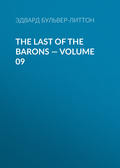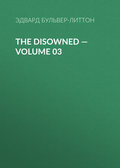
Эдвард Бульвер-Литтон
What Will He Do with It? — Volume 05
GEORGE MORLEY.—"With all respect for minnows and house-flies, if we found another Shakspeare, he might be better employed, like his predecessor, in selecting individualities from the classifications of man."
WAIFE.—"Being yourself a man, you think so: a housefly might be of a different opinion. But permit me, at least, to doubt whether such an investigator would be better employed in reference to his own happiness, though I grant that he would be so in reference to your intellectual amusement and social interests. Poor Shakspeare! How much he must have suffered!"
GEORGE MORLEY.—"You mean that he must have been racked by the passions he describes,—bruised by collision with the hearts he dissects. That is not necessary to genius. The judge on his bench, summing up evidence and charging the jury, has no need to have shared the temptations or been privy to the acts of the prisoner at the bar. Yet how consummate may be his analysis!"
"No," cried Waife, roughly. "No! Your illustration destroys your argument. The judge knows nothing of the prisoner. There are the circumstances; there is the law. By these he generalizes, by these he judges,—right or wrong. But of the individual at the bar, of the world- the tremendous world—within that individual heart, I repeat, he knows nothing. Did he know, law and circumstances might vanish, human justice would be paralyzed. Ho, there! place that swart-visaged, ill-looking foreigner in the dock, and let counsel open the case; hear the witnesses depose! Oh, horrible wretch! a murderer! unmanly murderer!—a defenceless woman smothered by caitiff hands! Hang him up! hang him up! 'Softly,' whispers the POET, and lifts the veil from the assassin's heart. 'Lo! it is Othello the Moor!' What jury now dare find that criminal guilty? what judge now put on the black cap? who now says, 'Hang him up! hang him up!"
With such lifelike force did the Comedian vent this passionate outburst that he thrilled his listener with an awe akin to that which the convicted Moor gathers round himself at the close of the sublime drama. Even Sir Isaac was startled; and leaving his hopeless pursuit of the water-rat, uttered a low bark, came to his master, and looked into his face with solemn curiosity.
WAIFE (relapsing into colloquial accents).—"Why do we sympathize with those above us more than with those below? why with the sorrows of a king rather than those of a beggar? why does Sir Isaac sympathize with me more than (let that water-rat vex him ever so much) I can possibly sympathize with him? Whatever be the cause, see at least, Mr. Morley, one reason why a poor creature like myself finds it better employment to cultivate the intimacy of brutes than to prosecute the study of men. Among men, all are too high to sympathize with me; but I have known two friends who never injured nor betrayed. Sir Isaac is one; Wamba was another. Wamba, sir, the native of a remote district of the globe (two friends civilized Europe is not large enough to afford any one man), Wamba, sir, was less gifted by nature, less refined by education, than Sir Isaac; but he was a safe and trustworthy companion: Wamba, sir, was—an opossum."
GEORGE MORLEY.—"Alas, my dear Mr. Waife, I fear that men must have behaved very ill to you."
WAIFE.—"I have no right to complain. I have behaved very ill to myself. When a man is his own enemy, he is very unreasonable if he expect other men to be his benefactors."
GEORGE MORLEY (with emotion).—"Listen, I have a confession to make to you. I fear I have done you an injury, where, officiously, I meant to do a kindness." The scholar hurried on to narrate the particulars of his visit to Mrs. Crane. On concluding the recital, he added, "When again I met you here, and learned that your Sophy was with you, I felt inexpressibly relieved. It was clear then, I thought, that your grandchild had been left to your care unmolested, either that you had proved not to be the person of whom the parties were in search, or family affairs had been so explained and reconciled that my interference had occasioned you no harm. But to-day I have a letter from my father which disquiets me much. It seems that the persons in question did visit Gatesboro', and have maligned you to Mr. Hartopp. Understand me, I ask for no confidence which you may be unwilling to give; but if you will arm me with the power to vindicate your character from aspersions which I need not your assurance to hold unjust and false, I will not rest till that task be triumphantly accomplished."
WAIFE (in a tone calm but dejected).—"I thank you with all my heart. But there is nothing to be done. I am glad that the subject did not start up between us until such little service as I could render you, Mr. Morley, was pretty well over. It would have been a pity if you had been compelled to drop all communication with a man of attainted character, before you had learned how to manage the powers that will enable you hereafter to exhort sinners worse than I have been. Hush, sir! you feel that, at least now, I am an inoffensive old man, labouring for a humble livelihood. You will not repeat here what you may have heard, or yet hear, to the discredit of my former life. You will not send me and my grandchild forth from our obscure refuge to confront a world with which we have no strength to cope. And, believing this, it only remains for me to say, Fare-you-well, sir."
"I should deserve to lose spe-spe-speech altogether," cried the Oxonian, gasping and stammering fearfully as he caught Waife firmly by the arm, "if I suffered—suff-suff-suff—"
"One, two! take time, sir!" said the Comedian, softly. And with a sweet patience he reseated himself on the bank. The Oxonian threw himself at length by the outcast's side; and, with the noble tenderness of a nature as chivalrously Christian as Heaven ever gave to priest, he rested his folded hands upon Waife's shoulder, and looking him full and close in the face, said thus, slowly, deliberately, not a stammer, "You do not guess what you have done for me; you have secured to me a home and a career; the wife of whom I must otherwise have despaired; the Divine Vocation on which all my earthly hopes were set, and which I was on the eve of renouncing: do not think these are obligations which can be lightly shaken off. If there are circumstances which forbid me to disabuse others of impressions which wrong you, imagine not that their false notions will affect my own gratitude,—my own respect for you!"
"Nay, sir! they ought; they must. Perhaps not your exaggerated gratitude for a service which you should not, howover, measure by its effects on yourself, but by the slightness of the trouble it gave to me; not perhaps your gratitude, but your respect, yes."
"I tell you no! Do you fancy that I cannot judge of a man's nature without calling on him to trust me with all the secrets—all the errors, if you will—of his past life? Will not the calling to which I may now hold myself destined give me power and commandment to absolve all those who truly repent and unfeignedly believe? Oh, Mr. Waife! if in earlier days you have sinned, do you not repent? and how often, in many a lovely gentle sentence dropped unawares from your lips, have I had cause to know that you unfeignedly believe! Were I now clothed with sacred authority, could I not absolve you as a priest? Think you that, in the meanwhile, I dare judge you as a man? I,—Life's new recruit, guarded hitherto from temptation by careful parents and favouring fortune,—I presume to judge, and judge harshly, the gray-haired veteran, wearied by the march, wounded in the battle!"
"You are a noble-hearted human being," said Waife, greatly affected. "And, mark my words, a mantle of charity so large you will live to wear as a robe of honour. But hear me, sir! Mr. Hartopp also is a man infinitely charitable, benevolent, kindly, and, through all his simplicity, acutely shrewd; Mr. Hartopp, on hearing what was said against me, deemed me unfit to retain my grandchild, resigned the trust I had confided to him, and would have given me alms, no doubt, had I asked them, but not his hand. Take your hands, sir, from my shoulder, lest the touch sully you."
George did take his hands from the vagrant's shoulder, but it was to grasp the hand that waived them off and struggled to escape the pressure. "You are innocent! you are innocent! forgive me that I spoke to you of repentance as if you had been guilty. I feel you are innocent,—feel it by my own heart. You turn away. I defy you to say that you are guilty of what has been laid to your charge, of what has darkened your good name, of what Mr. Hartopp believed to your prejudice. Look me in the face and say, 'I am not innocent; I have not been belied."'
Waife remained voiceless, motionless.
The young man, in whose nature lay yet unproved all those grand qualities of heart, without which never was there a grand orator, a grand preacher,—qualities which grasp the results of argument, and arrive at the end of elaborate reasoning by sudden impulse,—here released Waife's hand, rose to his feet, and, facing Waife, as the old man sat with face averted, eyes downcast, breast heaving, said loftily,
"Forget that I may soon be the Christian minister whose duty bows his ear to the lips of Shame and Guilt; whose hand, when it points to Heaven, no mortal touch can sully; whose sublimest post is by the sinner's side. Look on me but as man and gentleman. See, I now extend this hand to you. If, as man and gentleman, you have done that which, could all hearts be read, all secrets known, human judgment reversed by Divine omniscience, forbids you to take this hand,—then reject it, go hence: we part! But if no such act be on your conscience, however you submit to its imputation,—THEN, in the name of Truth, as man and gentleman to man and gentleman, I command you to take this right hand, and, in the name of that Honour which bears no paltering, I forbid you to disobey."
The vagabond rose, like the Dead at the spell of a Magician,—took, as if irresistibly, the hand held out to him. And the scholar, overjoyed, fell on his breast, embracing him as a son.
"You know," said George, in trembling accents, "that the hand you have taken will never betray, never desert; but is it—is it really powerless to raise and to restore you to your place?"
"Powerless amongst your kind for that indeed," answered Waife, in accents still more tremulous. "All the kings of the earth are not strong enough to raise a name that has once been trampled into the mire. Learn that it is not only impossible for me to clear myself, but that it is equally impossible for me to confide to mortal being a single plea in defence if I am innocent, in extenuation if I am guilty. And saying this, and entreating you to hold it more merciful to condemn than to question me, —for question is torture,—I cannot reject your pity; but it would be mockery to offer me respect!"
"What! not respect the fortitude which calumny cannot crush? Would that fortitude be possible if you were not calm in the knowledge that no false witnesses can mislead the Eternal Judge? Respect you! yes,—because I have seen you happy in despite of men, and therefore I know that the cloud around you is not the frown of Heaven."
"Oh," cried Waife, the tears rolling down his cheeks, "and not an hour ago I was jesting at human friendship, venting graceless spleen on my fellow-men! And now—now—ah, sir! Providence is so kind to me! And," said he, brushing away his tears, as the old arch smile began to play round the corner of his mouth, "and kind to me in the very quarter in which unkindness had so sorely smitten me. True, you directed towards me the woman who took from me my grandchild, who destroyed me in the esteem of good Mr. Hartopp. Well, you see, I have my sweet Sophy back again; we are in the home of all others I most longed for; and that woman, yes, I can, at least, thus far, confide to you my secrets, so that you may not blame yourself for sending her to Gatesboro',—that very woman knows of my shelter; furnished me with the very reference necessary to obtain it; has freed my grandchild from a loathsome bondage, which I could not have legally resisted; and should new persecutions chase us will watch and warn and help us. And if you ask me how this change in her was effected; how, when we had abandoned all hope of green fields, and deemed that only in the crowd of a city we could escape those who pursued us when discovered there, though I fancied myself an adept in disguise, and the child and the dog were never seen out of the four garret walls in which I hid them,—if you ask me, I say, to explain how that very woman was suddenly converted from a remorseless foe into a saving guardian, I can only answer 'By no wit, no device, no persuasive art of mine. Providence softened her heart, and made it kind, just at a moment when no other agency on earth could have rescued us from—from—"
"Say no more: I guess! the paper this woman showed me was a legal form authorizing your poor little Sophy to be given up to the care of a father. I guess! of that father you would not speak ill to me; yet from that father you would save your grandchild. Say no more. And yon quiet home, your humble employment, really content you?"
"Oh, if such a life can but last! Sophy is so well, so cheerful, so happy. Did not you bear her singing the other day? She never used to sing! But we had not been here a week when song broke out from her,— untaught, as from a bird. But if any ill report of me travel hither from Gatesboro' or elsewhere, we should be sent away, and the bird would be mute in my thorn-tree: Sophy would sing no more."
"Do not fear that slander shall drive you hence. Lady Montfort, you know, is my cousin, but you know not—few do—how thoroughly generous and gentle-hearted she is. I will speak of you to her,—oh! do not look alarmed. She will take my word when I tell her, 'That is a good man;' and if she ask more, it will be enough to say, 'Those who have known better days are loth to speak to strangers of the past.'"
"I thank you earnestly, sincerely," said Waife, brightening up. "One favour more: if you saw in the formal document shown to you, or retain on your memory, the name of—of the person authorized to claim Sophy as his child, you will not mention it to Lady Montfort. I am hot sure if ever she heard that name, but she may have done so, and—and—" he paused a moment, and seemed to muse; then went on, not concluding his sentence. "You are so good to me, Mr. Morley, that I wish to confide in you as far as I can. Now, you see, I am already an old man, and my chief object is to raise up a friend for Sophy when I am gone,—a friend in her own sex, sir. Oh, you cannot guess how I long, how I yearn, to view that child under the holy fostering eyes of a woman. Perhaps if Lady Montfort saw my pretty Sophy she might take a fancy to her. Oh, if she did! if she did! And Sophy," added Waife, proudly, "has a right to respect. She is not like me,—any hovel is good enough for me; but for her! Do you know that I conceived that hope, that the hope helped to lead me back here when, months ago, I was at Humberston, intent upon rescuing Sophy; and saw—though," observed Waife, with a sly twitch of the muscles round his mouth, "I had no right at that precise moment to be seeing anything—Lady Montfort's humane fear for a blind old impostor, who was trying to save his dog—a black dog, sir, who had dyed his hair—from her carriage wheels. And the hope became stronger still, when, the first Sunday I attended yon village church, I again saw that fair—wondrously fair—face at the far end,—fair as moonlight and as melancholy. Strange it is, sir, that I—naturally a boisterous, mirthful man, and now a shy, skulking fugitive—feel more attracted, more allured towards a countenance, in proportion as I read there the trace of sadness. I feel less abased by my own nothingness, more emboldened to approach and say, 'Not so far apart from me: thou too hast suffered.' Why is this?"
GEORGE MORLEY.—"'The fool hath said in his heart that there is no God;' but the fool hath not said in his heart that there is no sorrow,—pithy and most profound sentence; intimating the irrefragable claim that binds men to the Father. And when the chain tightens, the children are closer drawn together. But to your wish: I will remember it. And when my cousin returns, she shall see your Sophy."







